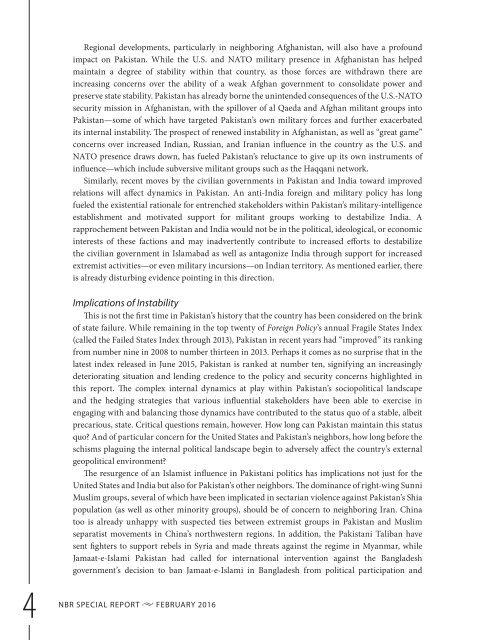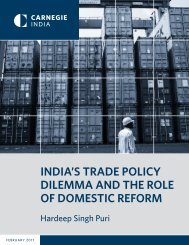pakistan’s
1KZtdpy
1KZtdpy
Create successful ePaper yourself
Turn your PDF publications into a flip-book with our unique Google optimized e-Paper software.
Regional developments, particularly in neighboring Afghanistan, will also have a profound<br />
impact on Pakistan. While the U.S. and NATO military presence in Afghanistan has helped<br />
maintain a degree of stability within that country, as those forces are withdrawn there are<br />
increasing concerns over the ability of a weak Afghan government to consolidate power and<br />
preserve state stability. Pakistan has already borne the unintended consequences of the U.S.-NATO<br />
security mission in Afghanistan, with the spillover of al Qaeda and Afghan militant groups into<br />
Pakistan—some of which have targeted Pakistan’s own military forces and further exacerbated<br />
its internal instability. The prospect of renewed instability in Afghanistan, as well as “great game”<br />
concerns over increased Indian, Russian, and Iranian influence in the country as the U.S. and<br />
NATO presence draws down, has fueled Pakistan’s reluctance to give up its own instruments of<br />
influence—which include subversive militant groups such as the Haqqani network.<br />
Similarly, recent moves by the civilian governments in Pakistan and India toward improved<br />
relations will affect dynamics in Pakistan. An anti-India foreign and military policy has long<br />
fueled the existential rationale for entrenched stakeholders within Pakistan’s military-intelligence<br />
establishment and motivated support for militant groups working to destabilize India. A<br />
rapprochement between Pakistan and India would not be in the political, ideological, or economic<br />
interests of these factions and may inadvertently contribute to increased efforts to destabilize<br />
the civilian government in Islamabad as well as antagonize India through support for increased<br />
extremist activities—or even military incursions—on Indian territory. As mentioned earlier, there<br />
is already disturbing evidence pointing in this direction.<br />
Implications of Instability<br />
This is not the first time in Pakistan’s history that the country has been considered on the brink<br />
of state failure. While remaining in the top twenty of Foreign Policy’s annual Fragile States Index<br />
(called the Failed States Index through 2013), Pakistan in recent years had “improved” its ranking<br />
from number nine in 2008 to number thirteen in 2013. Perhaps it comes as no surprise that in the<br />
latest index released in June 2015, Pakistan is ranked at number ten, signifying an increasingly<br />
deteriorating situation and lending credence to the policy and security concerns highlighted in<br />
this report. The complex internal dynamics at play within Pakistan’s sociopolitical landscape<br />
and the hedging strategies that various influential stakeholders have been able to exercise in<br />
engaging with and balancing those dynamics have contributed to the status quo of a stable, albeit<br />
precarious, state. Critical questions remain, however. How long can Pakistan maintain this status<br />
quo? And of particular concern for the United States and Pakistan’s neighbors, how long before the<br />
schisms plaguing the internal political landscape begin to adversely affect the country’s external<br />
geopolitical environment?<br />
The resurgence of an Islamist influence in Pakistani politics has implications not just for the<br />
United States and India but also for Pakistan’s other neighbors. The dominance of right-wing Sunni<br />
Muslim groups, several of which have been implicated in sectarian violence against Pakistan’s Shia<br />
population (as well as other minority groups), should be of concern to neighboring Iran. China<br />
too is already unhappy with suspected ties between extremist groups in Pakistan and Muslim<br />
separatist movements in China’s northwestern regions. In addition, the Pakistani Taliban have<br />
sent fighters to support rebels in Syria and made threats against the regime in Myanmar, while<br />
Jamaat-e-Islami Pakistan had called for international intervention against the Bangladesh<br />
government’s decision to ban Jamaat-e-Islami in Bangladesh from political participation and<br />
4<br />
NBR<br />
SPECIAL REPORT u FEBRUARY 2016



